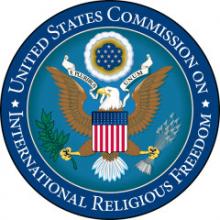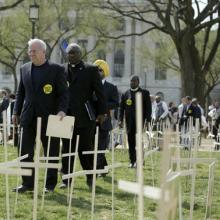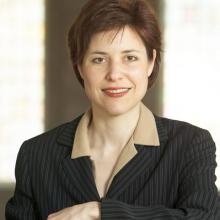rabbi david saperstein
Since winning the election with strong support from conservative evangelical voters, President Trump has invited their leaders to the White House, and banned government funding for groups that support or perform abortions overseas.
But he has yet to move on one item that many of them care about.
No one has been named to direct the Office of Faith-based and Neighborhood Partnerships, which, since 2001, has linked government with a broad range of religious groups.
President Trump is reportedly considering naming former Baylor University President Ken Starr to head the State Department’s Office of International Religious Freedom.
The ambassador-at-large for international religious freedom monitors religious persecution and discrimination worldwide, and develops programs to promote religious freedom, according to the State Department website.
From imprisonment to torture to beheadings, more Christians worldwide live in fear for their lives than at any time in the modern era.
That’s the message from Open Doors USA, which released its annual World Watch List on Jan. 7. Christian persecution reached historic levels in 2014, with approximately 100 million Christians around the world facing possible dire consequences for merely practicing their religion, according to the report. If current trends persist, many believe 2015 could be even worse.
“In regions where Christians are being persecuted as central targets, the trends and issues we track are expanding,” said David Curry, president of Open Doors, a nonprofit that aids persecuted Christians in the most oppressive countries and ranks nations based on the severity of persecution.
North Korea tops Open Doors’ list as the worst oppressor of Christians for the 13th consecutive year, but the list is dominated by African and Middle Eastern nations. Iraq, which experienced the mass displacement of Christians from its northern region, ranked third. Syria was listed fourth, due to the reign of ISIS in that war-torn region. Nigeria ranked 10th, due in part to the more than 1,000 Christians murdered or kidnapped by terrorist groups such as Boko Haram. Also included in the top 10 are Somalia, Afghanistan, Sudan, Iran, Pakistan, and Eritrea.
The Senate has confirmed Rabbi David Saperstein as the State Department’s ambassador-at-large for international religious freedom, making him the first non-Christian to hold the job.
Saperstein, who led the Reform Jewish movement’s Washington office for 40 years, focusing on social justice and religious freedom issues, was nominated by President Obama in July and confirmed by a 62-35 vote on Dec. 12.
Saperstein takes a liberal bent on domestic issues, and all but one of the votes against him came from a Republican.
“Religious freedom faces daunting and alarming challenges worldwide,” Saperstein said at his confirmation hearing in September. “If confirmed, I will do everything within my abilities and influence to engage every sector of the State Department and the rest of the U.S. government to integrate religious freedom into our nation’s statecraft and foreign policies.”
Saperstein, named the most influential rabbi in America by Newsweek magazine in 2009, will head the State Department’s Office of International Religious Freedom, where he will be tasked with monitoring religious freedom abuses around the world.
An independent religious freedom watchdog panel has welcomed the State Department’s annual religious freedom report and its list of the world’s worst offenders, which had laid dormant for three years.
The list of “countries of particular concern” had remained unchanged since 2006 — and hasn’t been formally issued by the State Department since 2011 — when Burma, China, Eritrea, Iran, North Korea, Saudi Arabia, Sudan and Uzbekistan were cited.
In April, the U.S. Commission on International Religious Freedom recommended that the list be doubled to include Turkmenistan, Tajikistan, Vietnam, Pakistan, Syria, Iraq, Nigeria, and Egypt. Turkmenistan was the only new addition to this year’s CPC list, bringing the total to nine countries.
The State Department and the independent USCIRF have often been at odds on who makes the list of worst offenders, and in a statement, USCIRF noted the “disappointing omission” of Pakistan in particular.
“Pakistan represents the worst situation in the world for religious freedom for countries not currently designated by the U.S. government as CPCs,” said USCIRF Chair Katrina Lantos Swett.
President Obama on Monday said he plans to tap Rabbi David Saperstein as the next ambassador-at-large for international religious freedom, the first non-Christian to hold the job, which was created in 1998.
As ambassador, the man named as the most influential rabbi in America by Newsweek magazine in 2009, will head the State Department’s Office of International Religious Freedom, and will be tasked with monitoring religious freedom abuses around the world.
“When it comes to the work of protecting religious freedom, it is safe to say that David Saperstein represents the gold standard,” said Secretary of State John Kerry, announcing the nomination at the State Department.
A Reform rabbi and lawyer, Saperstein, 66, has led the Religious Action Center of Reform Judaism for 40 years, and has spent his career in Washington, focusing on social justice and religious freedom issues. He was instrumental in the 1993 passage of the Religious Freedom Restoration Act, which requires the government to show a compelling reason for any action that impinges upon the exercise of religion.
Clergy from California to Connecticut created a makeshift graveyard symbolizing victims of gun violence on the National Mall on Thursday as they exhorted Congress to pass legislation to limit access to firearms.
Standing in front of 3,300 grave markers — representing the number of people who have died in gun violence since December’s massacre in Newtown, Conn. — more than 25 ministers, rabbis and other religious leaders decried as “idolatrous” a society that values guns more than human life.
“We don’t have a Second Amendment issue,” said the Rev. Matt Crebbin of Newtown Congregational Church. “We have a Second Commandment crisis.
Church-state expert Melissa Rogers will be the new director of the White House Office of Faith-based and Neighborhood Partnerships.
“I’m honored to be able to serve President Obama by forging and promoting a wide range of effective partnerships with faith-based and secular nonprofits that help people in need,” Rogers said in a statement on Wednesday. Rogers succeeds Joshua DuBois, who left the office in February after serving throughout President Obama’s first term.
Rogers is already well-acquainted with the office she will direct. She chaired the office’s first advisory council and spearheaded its work to reform the office. In 2010, President Obama signed an executive order reflecting recommendations from the council that called for greater transparency and clearer rules for religious groups that receive federal grants.







